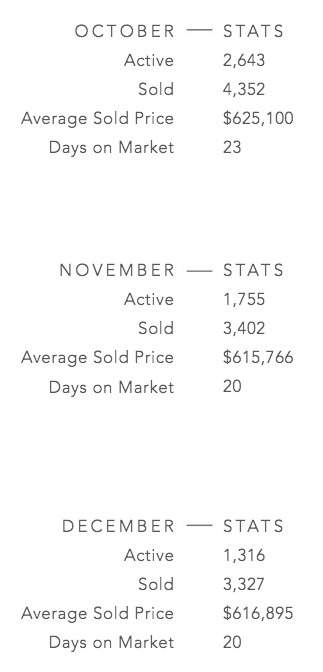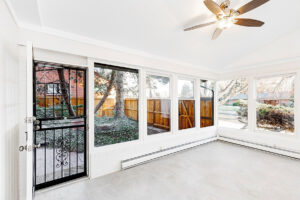A wild Denver real estate market continues in 2021
Denver’s record-low inventory will continue into 2021, it looks like, and continue as the dominant factor in the housing market.
The 2,541 active Denver metro listings at the end of December represent a three-decade low and a 49.6 percent drop from a year ago, according to Denver Metropolitan Association of Realtors data. That leaves us with just 0.3 months of inventory (six months signals a balanced market between supply and demand).

Source: Denver Metropolitan Association of Realtors 2020 Year-End Report
Mortgage interest rates at all-time lows — below 2.7 percent on 30-year fixed-rate loans — not only mean more buyers are out in the market chomping at the bit, but more homeowners have refinanced at these low rates and choosing to remodel their homes rather than hunt for a new one.
This has led to mind-boggling home sale speeds; in November 2020, nearly half of the homes that sold in Denver metro (47.7 percent) went over asking price, according First American Title Data. This extreme imbalance in supply and demand has continued to push average Denver metro home closed prices to all-time highs, which stood at $525,185 in December.

The story of Denver geography + home type
Covid-19 has undeniably shifted the types of homes in demand in Denver and thrust the market into uncharted territory. Buyers, who have gotten intimately connected with home over the last year, are looking for larger lots, more square footage and, in general, a quieter, more spacious and enjoyable place to nest.
Not only has this pushed demand down in the city center and downtown, but has spiked it in suburban areas, especially those west of I-25.
My Southern Hills listing provides an example of the intense demand for these suburban areas. The 11,600-square-foot corner lot at 3216 South Clayton Street sold $100,000 over asking for over $1.2 million.
3216 South Clayton Street photos.
This increased buyer demand for more space means that Denver is increasingly becoming a tale of two markets — one for detached, single-family homes, which are in high demand — and attached homes, such as townhomes, which have lower demand.
The vaccine effect
But, when we get Covid-19 under control, life and energy will likely return downtown. Walkability and easy access to restaurants, nightlife, sporting events and more will spur attraction to city center.
The typical Denver real estate market season features a slow rise in inventory beginning in March and peaking in September, but 2021 inventory increases will likely shift to later in the year as the vaccine rolls out and sellers, shy about listing or moving during Covid, begin listing.

Denver 4Q Real Estate Stats. Source: milehimodern 4Q Report
Buyers
With this intense market, buyers who want to win a home need to position their offer as close to cash as possible. This, of course, comes with challenges, but there are an increasing number of options for buyers looking to do this. Reach out, I can suggest some.
With that, buyers should expect to make aggressive offers on the homes they want — for example, make earnest money go hard upon an offer being accepted and waiving appraisal and loan termination deadlines.
Earnest money goes hard right up front on single-family. Attached market is a different market — people want space. This does not apply to downtown Denver.
Sellers
Homeowners thinking of selling — especially those of single-family homes — have an opportunity to move up at a great time — buyers are aggressive and interest rates are low for the purchase of a dream home potentially larger, near parks and outdoor recreation (like neighborhoods near the High Line Canal)
In short, sellers have a great opportunity now to move up and get more home for about the same mortgage payment.




